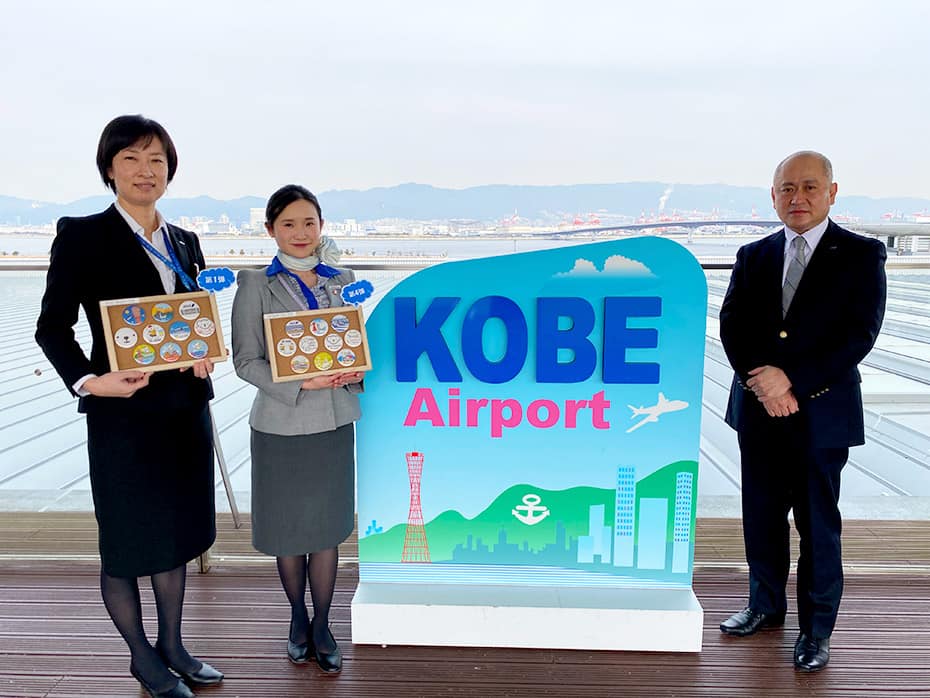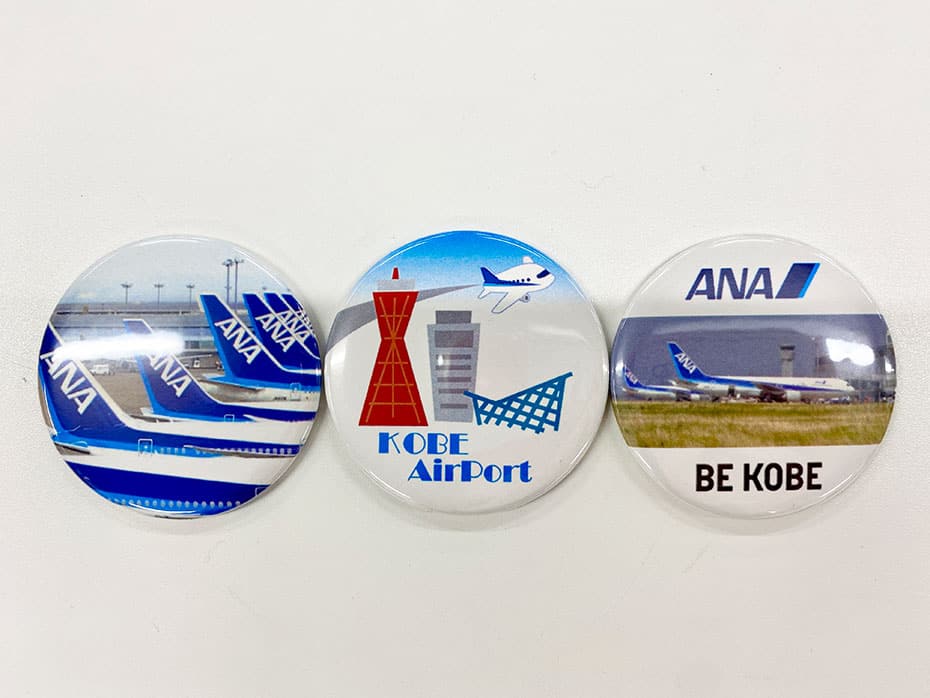2022/03/31
We would like to introduce Kobe Airport's unique social contribution efforts using capsule toy vending machines.
Capsule Toys of Kobe Airport
In front of the ANA check-in counter at Kobe Airport, there are two capsule toy vending machines (called gacha-gacha in Japanese), which have been very well received as a memento of the trip to Kobe. The contents of the capsule toys are can badges and magnets designed and produced by airline employees, and feature original designs inspired by Kobe and the airport.


On average, about 700 units of the 100 yen (about 1USD)-per-piece capsule toys are sold each month and the proceeds are donated to support facilities for pediatric cancer patients and the Japanese Red Cross Society. This social contribution using capsule toy vending machines began with a suggestion from Mr. Tani, the director of ANA Kobe Airport.
ANA Kobe Airport had been participating in volunteer activities in Kobe every year since 2013, but due to the spread of the COVID-19, this was no longer possible. He therefore came up with a new idea to continue their social contribution, which is to install capsule toy vending machines as a "donation box" at the airport and donate the proceeds to charity.


All proceeds from the sales of the capsule toy vending machines are used for donations and the purchase of materials. A portion of the proceeds from March 2021 through May 2021 was donated to a facility for pediatric cancer patients. We also received a certificate of commendation for donating a portion of sales proceeds from June 2021 to November 2021 to the Japanese Red Cross Society.
Originally designed can badges and magnets are produced by ANA Group employees working at ANA Kobe Airport and sold in capsule toy vending machines. A total of 10 designs are currently available (as of March 2022) in the fourth series, and the switchover to the new design occurs four times a year (at the beginning of April, July, October, and January). In addition, from an ecological perspective, used capsules are collected, carefully sterilized, and reused.
In addition to ANA, the production and sale of badges and magnets are supported by our partner airlines Solaseed Air and AIRDO, which operate flights to Kobe Airport, the City of Kobe, and the Kobe Convention & Visitors Bureau.
When you stop by Kobe Airport, please enjoy the "gacha-gacha" (capsule toy vending machines) in front of the ANA check-in counter as a memento of your trip.
The Badge Making Process
The badge making process is divided into four steps and is carried out using two specialized machines: one machine cuts the paper into a round shape that will become the badge design, and the other machine combines the metal parts and the design paper to produce the badge itself.
<Four steps of badge making>
- (1) Cut the design into a round shape
(2) Combine metal parts and design
(3) Attach safety pin parts on the reverse side of the badge
(4) Bagging of the finished badges
The video below introduces the production process of badges made by ANA Group employees working at ANA Kobe Airport.
The Badge Making Process
This 34-second video shows the process of badge making. Music plays along with the video.
First, the paper on which the badge design is drawn is cut out into a round shape using a special machine that cuts out round shapes.
Next, the metal parts of the badge is set in another special machine for making badges, and the cut-out round paper and the transparent round sheet are set on top of the metal parts. Push the lever of the machine down by hand, and the body part of the badge is created.
Then, the safety pin is attached to the back of the created badge body. Creation of the badge is now completed.
Next, wrap the finished badge with a small wrapping bag, and put it into a colorful capsule, to complete the process.
At last, an image of many colorful capsules with the completed badges are shown.
Interview with the person in charge
We interviewed Mr. Tani, the director of ANA Kobe Airport, and Ms. Ogawa and Ms. Ando from ANA Kobe Airport, who are in charge of this project.

◆Of all the social contribution activities, why did you choose to make badges and magnets and sell them in capsule toy vending machines?
(Mr. Tani) Before I became the director of Kobe Airport, I was the director of Tottori Airport and I had experience making and selling badges at Tottori Airport. When we were no longer able to make the annual social contribution activities due to COVID-19, I wondered if we could do the same at Kobe Airport by making and selling badges, with the proceeds going to charity. At the same time, we considered a non-contact sales method, and thought that if we set up the capsule toy vending machines, customers would be able to purchase the badges by spinning the machines themselves, so we established a style of selling the badges in capsule toy vending machines.
(Ms.Ogawa) The location of the capsule toy vending machines is not in the boarding gate area, but they are placed in front of the check-in counter area, so they can be enjoyed not only by passengers boarding the plane, but also by visitors who come to visit the airport on their holidays. There are two capsule toy vending machines and one sells magnets, which are often purchased as souvenirs of travel, and the other one sells can badges, which are very popular with children.
◆Please tell us about the best moments for making and selling badges and magnets.
(Ms. Ando) When various ages and occupations, such as passenger services, flight operations, ground handling, and maintenance, come together to produce badges and magnets, a lot of communication takes place. I enjoy interacting with many employees while chatting and talking about work, which helps me to be upbeat about my work. I am very grateful for those communication opportunities that have been created through making badges and magnets.
I am also happy to see repeated customers. Customers sometimes ask me, "When is the next new design coming out?" and I find it rewarding to hear such comments.
(Ms. Ogawa) Employees of Family Mart (convinience store) across from the ANA check-in counter often come and purchase the capsule toys, and we are happy to see that they display their collections of purchased magnets next to the cash register.
◆What do you look for when deciding on a design?
(Ms. Ogawa and Ms. Ando) Team members who sponsor initiatives aimed at enhancing corporate values at ANA Kobe Airport solicit and select designs and obtain permission to use them from various related companies. Designs are solicited from the ANA Group employees working at ANA Kobe Airport, and we receive many ideas each time in a variety of media, including processed designs from photographs taken, digital and handwritten designs, etc. While keeping in mind "the designs that we also want," we strive to choose and create designs that appeal to a wide range of people, from children to aviation fans.
(Mr. Tani) Also, as Kobe Airport employees, we cherish the phrase "BE KOBE". The phrase "BE KOBE" was created in the wake of the Great Hanshin-Awaji Earthquake 20 years ago, and it expresses our sense of pride in each and every Kobe citizen who have worked together to recover from the disaster. We add the phrase "BE KOBE" to the design to express our hope for a recovery from COVID-19 by overlapping the thoughts of the recovery from the earthquake.

The production of badges and magnets not only contributes to the society, but also motivates employees by commercializing designs that they themselves came up with, and also has a positive impact on employees by creating more communication opportunities among employees of various occupations and ages who gather across departments to produce the capsule toys.
The ANA Group will continue to turn challenges into opportunities and contribute to society in every possible way.





